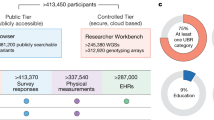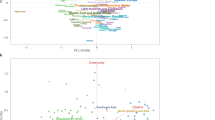Abstract
Replying to: F. Massol & P. Crochet Nature 451, 10.1038/nature06743 (2008).
The more an individual stands to lose, the more cautious that individual should be. We have shown1 that this basic principle gives rise to consistent individual differences in risk-related behaviour whenever individuals have different future fitness expectations. To illustrate this, we considered a model where differences in fitness expectations result from a trade-off between current and future reproduction. Massol and Crochet argue2 that the emergence of such differences depends on the shape of this trade-off. Their claim is based on the technical argument that our model has a ‘branching point’ only for a limited range of the trade-off parameter β. In contrast, we show here that the emergence of individual differences is a robust phenomenon that does not depend on such details. Our analysis illustrates the important insight that a branching point is not needed for the emergence of polymorphism.
This is a preview of subscription content, access via your institution
Access options
Subscribe to this journal
Receive 51 print issues and online access
$199.00 per year
only $3.90 per issue
Buy this article
- Purchase on Springer Link
- Instant access to full article PDF
Prices may be subject to local taxes which are calculated during checkout

Similar content being viewed by others
References
Wolf, M., van Doorn, G. S., Leimar, O. & Weissing, F. J. Life-history trade-offs favour the evolution of animal personalities. Nature 447, 581–584 (2007)
Massol, F. & Crochet, P. Do animal personalities emerge? Nature 451 10.1038/nature06743 (2008)
Geritz, S. A. H., Kisdi, E., Meszena, G. & Metz, J. A. J. Evolutionarily singular strategies and the adaptive growth and branching of the evolutionary tree. Evol. Ecol. 12, 35–57 (1998)
Waxman, D. & Gavrilets, S. 20 questions on adaptive dynamics. J. Evol. Biol. 18, 1139–1154 (2005)
Barton, N. H. & Polechova, J. The limitations of adaptive dynamics as a model of evolution. J. Evol. Biol. 18, 1186–1190 (2005)
Dieckmann, U. & Doebeli, M. Pluralism in evolutionary theory. J. Evol. Biol. 18, 1209–1213 (2005)
Lynch, M. & Walsh, B. Genetics and Analysis of Quantitative Traits (Sinauer Associates, Sunderland, 1998)
Barton, N. H. & Keightley, P. D. Understanding quantitative genetic variation. Nature Rev. Genet. 3, 11–21 (2002)
Eyre-Walker, A. & Keightley, P. D. The distribution of fitness effects of new mutations. Nature Rev. Genet. 8, 610–618 (2007)
Carroll, S. B. Endless Forms Most Beautiful: The New Science of Evo Devo (W.W. Norton & Co, New York, 2005)
Fisher, R. A. The Genetical Theory of Natural Selection Ch. 2 (Oxford Univ. Press, Oxford, 1930)
Author information
Authors and Affiliations
Rights and permissions
About this article
Cite this article
Wolf, M., van Doorn, G., Leimar, O. et al. Wolf et al. reply. Nature 451, E9–E10 (2008). https://doi.org/10.1038/nature06744
Issue Date:
DOI: https://doi.org/10.1038/nature06744
This article is cited by
-
Complex eco-evolutionary dynamics induced by the coevolution of predator–prey movement strategies
Evolutionary Ecology (2022)
-
Diversifying evolution of competitiveness
Nature Communications (2014)
Comments
By submitting a comment you agree to abide by our Terms and Community Guidelines. If you find something abusive or that does not comply with our terms or guidelines please flag it as inappropriate.



